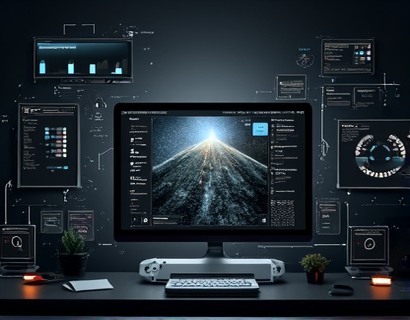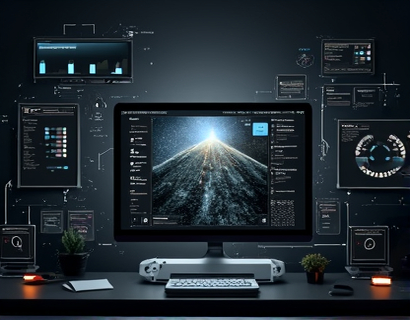AI-Powered Life Management: Enhancing Productivity with Intelligent Insights and Personalized Guidance
In the fast-paced world of today, managing personal and professional life efficiently is more challenging than ever. The integration of Artificial Intelligence (AI) into life management tools offers a revolutionary approach to overcoming these challenges. An AI-powered assistant can provide intelligent insights and personalized guidance, significantly enhancing productivity and personal efficiency. This advanced technology simplifies decision-making processes, streamlines task management, and supports the achievement of both personal and professional goals. By leveraging the power of AI, individuals can enjoy a more organized and smarter life, effectively navigating the complexities of daily life with ease.
The concept of an AI advisor is not new, but recent advancements in machine learning and natural language processing have made these tools more sophisticated and accessible. An AI advisor, often referred to as a digital assistant or virtual coach, uses algorithms to analyze user data, behavior patterns, and preferences to offer tailored recommendations. This personalized approach ensures that the guidance provided is relevant and actionable, making it easier for users to implement changes and improvements in their daily routines.
Key Features of AI-Powered Life Management Tools
AI-powered life management tools come equipped with a range of features designed to enhance productivity and efficiency. One of the primary functions is intelligent scheduling. These tools can analyze a user's calendar, commitments, and preferences to suggest optimal times for meetings, appointments, and tasks. By considering factors such as time zones, availability, and historical data, the AI can create a schedule that maximizes productivity and minimizes conflicts.
Task management is another critical aspect. AI assistants can break down complex projects into manageable tasks, assign priorities based on urgency and importance, and set deadlines. Users can receive reminders and notifications to ensure nothing slips through the cracks. The AI can also adapt to the user's workflow, learning from past behaviors to improve task allocation and suggestion accuracy over time.
Decision-making is significantly improved with AI-driven insights. By analyzing vast amounts of data, the AI can identify trends, predict outcomes, and suggest the best courses of action. This is particularly useful in professional settings where data-driven decisions are crucial. Whether it's choosing the most effective marketing strategy or deciding on investment opportunities, an AI advisor can provide valuable insights that enhance the quality of decisions.
Personalized Guidance for Optimal Performance
One of the most compelling aspects of AI-powered life management is the ability to offer personalized guidance. Each user is unique, with different strengths, weaknesses, and goals. An AI assistant can create a customized plan that aligns with an individual's specific needs and aspirations. This plan can include recommendations for skill development, time management techniques, and stress reduction strategies.
For instance, if a user is struggling with procrastination, the AI can suggest techniques such as the Pomodoro Technique or time blocking. It can also monitor progress and adjust the plan as needed, providing continuous support and motivation. This level of personalization ensures that users receive the exact guidance they need to overcome their challenges and achieve their objectives.
Enhancing Productivity Through Smart Insights
Productivity is not just about doing more in less time; it's also about doing the right things. AI-powered tools excel in providing smart insights that help users focus on high-impact activities. By analyzing user data, the AI can identify patterns and suggest areas where time and effort can be optimized. For example, it might recommend delegating certain tasks, automating repetitive processes, or eliminating distractions.
Another significant benefit is the ability to track and measure performance. AI assistants can set up key performance indicators (KPIs) and provide regular reports on progress. This data-driven approach allows users to make informed adjustments and continuously improve their productivity. The AI can also offer suggestions based on best practices and industry standards, ensuring that users stay ahead of the curve.
Seamless Integration into Daily Life
Integrating an AI-powered life management tool into daily life is straightforward and seamless. These tools can be accessed through various platforms, including smartphones, tablets, and computers, ensuring that users can stay connected and productive anytime, anywhere. The user interface is designed to be intuitive and user-friendly, making it easy to navigate and utilize the available features.
Notifications and alerts are another essential feature. Users can receive timely updates and reminders without having to constantly check the app. This hands-free approach ensures that important tasks and deadlines are never missed. Additionally, the AI can learn the user's preferences over time, adjusting the frequency and type of notifications to match their needs.
Building a Trusted Companion for a Smarter Life
The relationship between a user and an AI-powered life management tool is built on trust and reliability. The AI must be accurate, responsive, and respectful of user privacy. Transparency in how data is used and stored is crucial to maintaining this trust. Users should have control over their data, including the ability to export, modify, or delete it as needed.
Moreover, the AI should be designed to complement human intelligence rather than replace it. It should augment the user's capabilities, providing support and guidance without micromanaging. This balanced approach ensures that users remain in control of their lives while benefiting from the AI's insights and efficiency.
Case Studies and Real-World Applications
To better understand the impact of AI-powered life management tools, let's look at some real-world applications. In the corporate world, executives use these tools to manage their busy schedules, prioritize tasks, and make data-driven decisions. For example, an AI assistant might analyze meeting requests, email communications, and project deadlines to suggest the most efficient way to allocate time throughout the day.
In the realm of personal development, individuals use AI-powered tools to set and achieve fitness goals. The AI can track workouts, monitor nutrition, and provide motivational messages based on progress. It can also suggest new exercises or training plans to prevent plateaus and keep the user engaged.
Another practical application is in managing household chores and finances. An AI assistant can create a budget, track expenses, and offer tips for saving money. It can also schedule maintenance tasks and remind users of important dates, such as bill payments or appointments.
Future Trends in AI-Powered Life Management
The future of AI-powered life management is exciting, with several trends on the horizon. One significant development is the integration of emotional intelligence. AI assistants will become more adept at recognizing and responding to users' emotional states, providing empathetic support and tailored advice. This emotional awareness can enhance the user experience, making the AI a more reliable and comforting companion.
Another trend is the incorporation of augmented reality (AR) and virtual reality (VR) technologies. These immersive experiences can provide interactive tutorials, simulations, and visualizations to help users better understand complex concepts and strategies. For instance, an AR app could guide a user through a home organization project, showing step-by-step instructions and suggesting optimal placements for furniture and storage solutions.
Privacy and security will continue to be top priorities. As AI tools become more pervasive, ensuring the protection of user data will be crucial. Advanced encryption methods, decentralized data storage, and robust privacy policies will be essential in building user trust and confidence.
Conclusion
AI-powered life management tools represent a significant leap forward in personal and professional productivity. By providing intelligent insights and personalized guidance, these tools help individuals navigate the complexities of modern life with greater ease and efficiency. Whether it's optimizing schedules, enhancing decision-making, or supporting personal growth, AI assistants offer a comprehensive solution for achieving one's goals. As technology continues to evolve, the potential for AI to transform our lives is immense, promising a future where productivity and well-being go hand in hand.










































